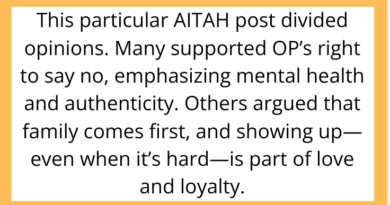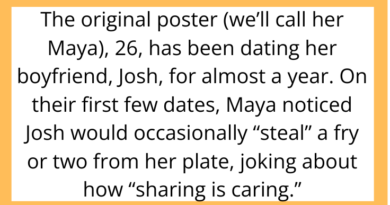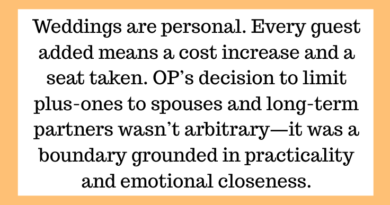AITAH for Refusing to Pay for My Girlfriend’s Cosmetic Surgery After She Quit Her Job?
Relationships often involve compromise, shared goals, and financial cooperation—but what happens when priorities don’t align? Today’s AITAH story dives into a controversial clash between personal autonomy and financial responsibility. When a boyfriend says “no” to funding elective surgery, is he being unsupportive—or simply setting a boundary?
Let’s unpack the situation that’s lighting up the internet.
The Scenario: A Surprise Request Turns Into a Standoff

The original poster (let’s call him Daniel), 31, explained that he’s been dating his girlfriend Maya, 28, for over two years. Maya recently quit her job to “focus on her mental health and personal projects,” a decision Daniel supported emotionally, though it added some financial pressure.
A few weeks into her unemployment, Maya told Daniel she wanted to get rhinoplasty and breast augmentation—cosmetic surgeries she’d dreamed of for years. The catch? She couldn’t afford it now that she wasn’t working, so she asked Daniel to pay.
Daniel was taken aback. He reminded her they were already tightening their budget, and that cosmetic surgery wasn’t something he could justify funding—especially when she had no income.
Maya was hurt. She told him he wasn’t “investing in her happiness,” and accused him of being selfish and controlling. Now, their relationship is on thin ice, and Daniel is wondering: AITAH for saying no?
Drawing the Line: Support vs. Sponsorship

Daniel’s Side: Boundaries Aren’t Betrayal
Daniel says he has no problem with Maya wanting surgery—it’s her body, her choice. His issue is financial. As the sole earner, he’s already covering rent, utilities, groceries, and more. Adding thousands of dollars for elective surgery isn’t feasible for him right now.
And even if it were, is it fair to expect one partner to fund cosmetic procedures the other didn’t agree to prioritize?
Daniel also pointed out that Maya made the decision to quit her job independently. He didn’t object at the time—but that doesn’t mean he signed up to cover luxury expenses.
Maya’s View: Support Should Be Unconditional
Maya feels that Daniel is judging her for wanting to feel better about herself. She says he knew about her insecurities and previous interest in surgery when they started dating. To her, this isn’t just about looks—it’s about confidence, self-worth, and being taken seriously in her field.
She believes Daniel’s refusal isn’t just about money. She sees it as him not valuing her happiness—or her goals.
Reddit Reacts: Who’s the Real Villain?

The AITAH community delivered its usual mix of blunt honesty and nuanced debate. The general consensus? Daniel is not the villain.
Top Comments Say:
-
“You’re not her bank. Supporting her doesn’t mean funding everything she wants.”
-
“If it were medical or necessary, that’s different. This is elective, non-urgent, and expensive.”
-
“It’s unfair to quit your job and expect your partner to pay for luxury procedures.”
However, a few users pointed out that tone matters. If Daniel was dismissive or harsh, Maya might have felt invalidated—even if his stance was reasonable.
When Values Clash in a Relationship

Financial Priorities Must Be Aligned
Money is one of the top reasons relationships struggle. If one partner is practical and the other is more spontaneous, there’s bound to be friction.
Daniel and Maya clearly see money—and responsibility—very differently. For Daniel, bills and stability come first. For Maya, emotional well-being and self-image carry equal weight, even if they come with a price tag.
The Real Issue: Lack of Planning, Not Just Money
Maya quitting her job without a financial plan, and then immediately asking for a large favor, suggests a bigger disconnect. Did she assume Daniel would say yes? Did they have clear boundaries in place?
Daniel’s story is a reminder that major financial decisions should never be made based on assumptions.
Can This Relationship Be Saved?

It depends.
If Maya can understand that Daniel’s refusal isn’t a rejection of her, and if Daniel can approach the conversation with empathy rather than defensiveness, there’s hope.
They need to:
-
Revisit their financial expectations as a couple
-
Discuss long-term plans and individual responsibilities
-
Decide how to handle personal goals that require shared resources
Final Verdict: No, You’re Not the Villain

Setting financial boundaries—even in love—is not selfish. Daniel’s refusal wasn’t cruel, it was practical. While Maya’s desire for surgery is valid, expecting her partner to pay for it, especially after quitting her job, puts unfair pressure on the relationship.
Being a good partner doesn’t mean saying “yes” to everything. Sometimes, love means saying “not right now.”


